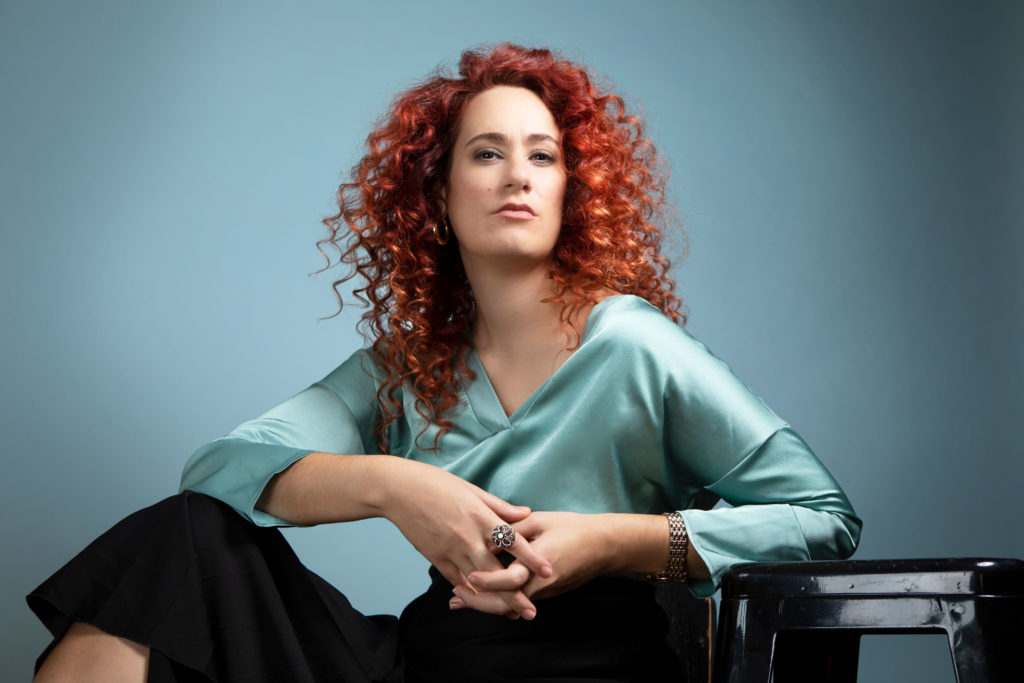
At Home With – Mezzo-Soprano Taxiarchoula Kanati in Stuttgart
By Chris Ruel“At Home With… ” is a series collaboration between OperaWire and photographer Frances Marshall of Marshall Light Studio, combining original photography with insightful interviews. In this third installment, OperaWire spoke with mezzo-soprano Taxiarchoula Kanati.
Greek mezzo-soprano Taxiarchoula Kanati was at the very cusp of moving into the next phase of her career when COVID-19 brought the world and the industry to a standstill. Her dramatic, full, “beast voice,” (a compliment given to her by a famous baritone), is perfect for the passion she has for singing the Verdi and Wagner repertoire.
Kanati made her debut as Dido (“Dido & Aeneas”), followed by Third Lady (“Magic Flute“), Baba (“The Medium”), Carmen (“Carmen“), Alcina (“Orlando Paladino”), Charlotte (“Werther“) and Composer (“Ariadne auf Naxos“).
As a finalist of the 28th International Competition “Kammeroper Schloss Rheinsberg 2018”, she was awarded a role in the world premiere of a new Faust opera for the Chamber Opera Festival at Rheinsberg.
During the 2019-20 season, Kanati debuted at her native Greek National Opera in the role of Prince Orlofsky in Strauss’s “Die Fledermaus.”
The mezzo is very comfortable on the concert stage, having sung the mezzo part in Beethoven’s “Missa Solemnis,” and the “Ninth Symphony” at the Liederhalle, Stuttgart, both during the 2018-19 season. And she has ventured into contemporary music, singing the world premiere of composer Jochen Neurath’s dramatic song cycle, “Tears.” Wagner’s “Wesendonck-Lieder” was on the same program and given at the Richard Wagner Association in Bamberg.
Kanati currently lives in Stuttgart where, like most of the world, she is hunkered down, waiting for the day when theaters will once more open and bring to life characters such as Venus from “Tannhäuser,” and Brangäne from “Tristan und Isolde”; roles she has worked on for several years. OperaWire spoke with the vivacious, fun, and inspiringly positive mezzo at home about her musical background, which has more in more in common with Metallica than Mozart (one of her favorite roles); the beloved femme fatale of opera, Carmen; and how she’s using her time during the pandemic to be ready for when the curtain opens once more.
OW: What’s it like in Stuttgart right now?
TK: Many of the stores are shut down, they’ve canceled everything and there is not really any live streaming here, although I see now in Hamburg they’re live streaming “Manon.” I have been watching historical productions of Verdi, taking walks in the woods and drinking lots of coffee.
OW: Tell me about your musical background.
TK: I was in a heavy metal band.
OW: I have to say, that’s not a typical answer. What made you decide to leave heavy metal behind?
TK: At age 15, I won a prize for singing. On the jury was a famous baritone with an international career, and he said “you have to become an opera singer.” When he gave me an autograph, he wrote “… to the one with the beast voice.” I was like, what does that mean?
While in the metal band I had a microphone and all that, but when listening to myself I realized that it wasn’t my voice. I went into opera because I could use my voice without electronics and it was so fantastic to make the sound from my own body and have my voice go through the orchestra and out into the audience.
OW: How quickly did you find your operatic sound?
I found it rather immediately. When I was in the band, the guy working the soundboard said my voice was too big. But I disagreed. Then I sang Dido, and the feelings I felt during the work were amazing.
OW: You were nearing the next phase of your career when COVID hit. Tell me what went on in your head. How did you feel?
TK: The first time I heard about COVID-19, it scared me. I was here in Germany, after “Fledermaus,” but you know, I lived in Athens for 13 years and lived through the money crisis. But this time, it was difficult for me to go on, to continue my dreams and work.
But then, I thought, “All right, Taxia, you have to go on.” We are all in this together. It also made me think about what kind of artist I wanted to be.
A year ago, I did a work session on Venus in the Paris version of “Tannhäuser” with Maestro Teodor Currentzis. He gave me such wonderful feedback that now I take immense joy in working on Wagner roles.
After that, I thought, “Go on. Don’t be scared.” That made me stronger for the future.
OW: What are some things you do to reduce your anxiety as you face an uncertain future?
TK: I am reading literature about the amalgamation of the body and brain. I do yoga, but it is a mix: not quite yoga or pilates, and that helps me relax.

Credit: Frances Marshall
OW: Walk me through a day in the life of Taxia.
TK: I work two or three hours per day on my repertoire. Then, two times per week, I work with a pianist. I work on my texts, and my characters to develop their personalities. But even before I sing, I read my text like a monologue.
I have been listening to Wagner a lot because my voice can handle the repertoire. And after working on Venus from “Tannhäuser,” I’m now working on Brangäne for “Tristan und Isolde.” I have been working on these for the past two or three years.
OW: Let’s talk about one character you have played, and that’s Carmen. How do you prepare for the role and become the character?
TK: I love Carmen. It was my favorite show, and I did it for five years. While living in Thessaloniki, I had a friend and we made music together every afternoon. He understood gypsy culture. They are so free and uninhibited, and that gave me many ideas about who she was.
I also watched the production with Agnes Baltsa and other singers as inspiration. For me, Carmen is not sexy, but she is wild. She is a strong character; she has power and an aura that makes her desirable. But you have to find the right balance.
OW: You’ve mentioned speaking the text as a monologue prior to singing. How do you work on the acting side of the art form?
TK: I have been reading books about theatre and directors; the technical side of how things work, like the Stanislavsky and Mamet methods.
When I read the text, I look for ways to bring in aspects of myself. I am Carmen and I am Taxia. I use feelings from within myself, and that’s Stanislavsky. But really, I have a palette of different feelings that I pull from. When I work with a director, we decide together which way we are going, and what color from the palette we are going to use.
OW: You sang the mezzo part in Verdi’s “Requiem,” which also seems to be a favorite of yours.
TK: The “Requiem” is a work I have sung six times. I hope to have opportunities to sing it even more. With “Requiem,” you have to be in the sound and really feel it with such a big orchestra.
OW: Tell me how you secured the mezzo part in “Requiem?”
I was here in Stuttgart for five years, and in 2015, I auditioned for two “Requiem” concerts; one for a concert at the main church of Stuttgart, and the second at the historical Cathedral Heilig-Kreuz Münster in the old town of Schwäbisch Gmünd near Stuttgart.
For concerts at the main church of the state of Baden-Württemberg there is a list of solo-singers who wait for almost two years. I was really lucky! For the audition, I performed some lieder from Strauss, and arias from “Carmen”, “Dido”, and “Samson and Delilah.” I had nine pieces, and I sang all nine!
When I sang the mezzo part, my voice felt like is was butter. It was then that I knew Verdi’s music was for me.
OW: You’re drawn to colossal works. What attracts you to these types of roles and concerts?
TK: I like to be different people, to play characters I couldn’t be in the real world. In Wagner, there are such strong women, some with magical powers—sorceresses, etcetera—and I try to find myself in these characters.
Musically, there are such long phrases and you have to sing with the full body—the entire body.
When I came to Germany for my Master’s studies many years ago, my teacher told me I should register for the Wagner Voices Competition in Bayreuth, and they selected me from 200 singers to be in the final 30.
It came as a surprise to me that I felt so comfortable singing the requested arias, and this was the first evidence that I had to learn the repertoire earlier than I had thought!
My voice is dramatic, it has the right color, and I have the vocal power for the repertoire, but apart from gaining confidence, everyone needs to find the right time for actually singing a dramatic repertoire.
As you know, my approach to roles is from an actor’s side as well as a singer’s, so for me practicing a composer’s roles requires not only the right vocal development but also studying the cultural history to understand where these operas come from. I am very glad that some years ago I received an artists scholarship for visiting an entire Bayreuth festival season.
OW: What do you find to be the most challenging aspects of singing Verdi and Wagner?
For Wagner, it is the long phrases, sung with your full body. For a mezzo, you have very low notes and very high notes, so you have to learn to use proper technique so you do not make mistakes and hurt your voice. Every time my teachers talk about technique, they stress “swimming with the air” I am producing. I have to combine the air and the sound together. The volume and everything comes from your body—from your legs up.
Think about Bach. For my body, it is not as much work, but I am always thinking about technique.



